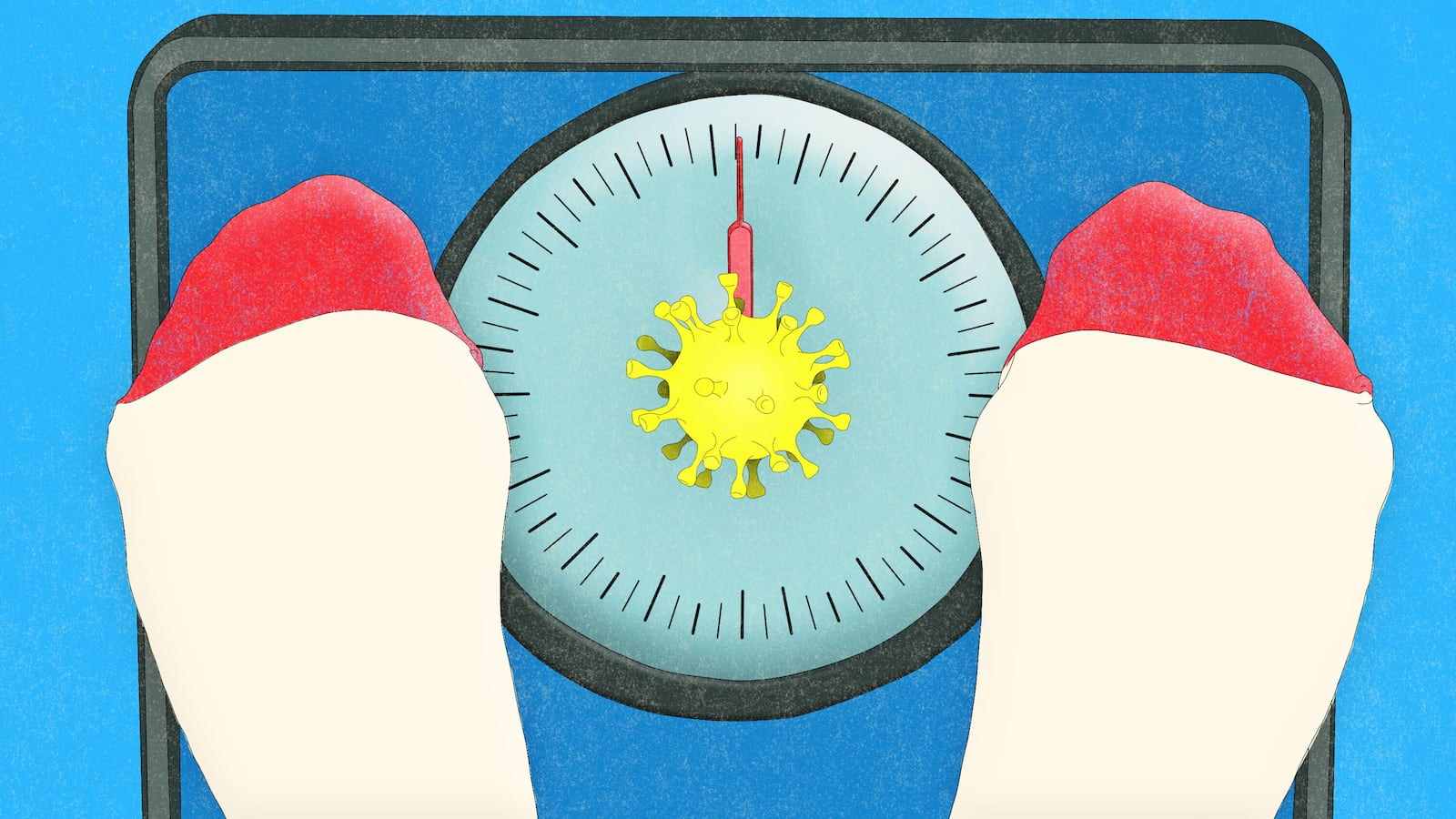Jennifer Williams just went back to yoga class for the first time in a year. The studio class she goes to—Yoga NoHo in Hollywood—had shuttered during the pandemic. It reopened this Monday, and by Tuesday Williams had booked a class with her favorite instructor.
Things were different, of course. Williams is used to a packed class, but only three people showed up. The decorative plants lining the lobby hadn’t fared well in lockdown—most had died. It had been hard for Williams to fit into her athletic clothes, since she’s gained some weight during her time away. She tried to keep up with her practice at home, but it wasn’t the same in front of a TV, without her community.
“I physically feel like I am right back to when I went to my very first yoga class,” Williams, who is 44, told The Daily Beast. “I’m just starting it all over again. My hamstrings are so tight.” Williams loved the class, but said she “crashed” when she got home.
“I came back, ate too many Twinkies, and went to sleep,” she said. Still, she’s thrilled to return to her regular schedule. She plans to attend class three days a week, and practice at night with her husband.
“Going back to class felt like Cheers, which I never understood because I don’t drink alcohol,” Williams said. “But it’s a place I can go where everyone knows me.” She wants to return for herself and the friends she’s made there—losing weight is not top of her mind.
“I think yoga is about stripping down to the essentials,” she explained. “That has nothing to do with what size my pants are. It has everything to do with my intentions, focus, and discipline. Those are the things I care about.”
Amy Conway, the editor-in-chief of Health magazine, thinks a lot about pants these days. “There is a lot of anxiety about pants at the moment,” she told The Daily Beast. “It’s a real thing. People’s work pants don’t fit, and that’s stressful to them as they go back to the office. We’ve become so foreign to the idea of zippers—people are actually getting confused about how to dress now.”
And it’s hard to blame them. As the vaccine rollout continues, many feel emboldened and hopeful for a summer that brings our much-desired “return to normal.” But one thing that’s depressingly familiar, and a sign that pre-pandemic priorities are back: body-shamers are out in full force.
When Krispy Kreme announced it would give anyone who provided their proof-of-vaccine card a free glazed donut this week, the Twittersphere erupted into a paternalistic debate over perceived health risks.
Dr. Leana Wen, a CNN medical analyst and former Baltimore city health commissioner, gave an unsolicited warning: Anyone who takes Krispy Kreme up on their offer of a free donut a day for a year stands to gain around 15 pounds.
The resounding answer: Who cares?
“It’s been a long fucking year,” Mary Trump weighed in. “Have a donut.”
“One Krispy Kreme a day keeps the haters away,” Kamala Harris’ niece Meena tweeted.
“I was so shocked to see the Krispy Kreme thing,” Carolyn L. Todd, a senior health writer for Self, said. “Really, haven’t we gotten our priorities in order in the last year? It’s a little sad to see that this is what we’re reverting to.”
Months of extremely unfunny jokes about “pandemic pounds” and the “quarantine 15” have given way to official studies.
A recent one from the American Psychological Association found that 42 percent of US adults reported an undesired weight gain, with an average gain of 29 pounds. Cue fatphobic hysteria.
But as a Reason article pointed out, this study only included information from respondents who acknowledged that their weight had changed. So the sample size wasn’t a full representation of Americans, and left out those whose bodies stayed the same—or who didn’t feel like sharing.
Another study from the University of California, San Francisco utilized Bluetooth-connected smart scales to track participants’ progress. Out of 269 adults, the average weight gain of this sample ended up being around half a pound every 10 days. That roughs out to 1.5 pounds a month.
A recent New York Times column by Jane Brody earned the ire of the internet after the writer tsk-tsked those who found solace baking while sheltering-in-place at home. (Remember the banana bread phase of quarantine?)
“While I understood their need to relieve stress, feel productive and perhaps help others less able or so inclined, bread, muffins and cookies were not the most wholesome products that might have emerged from pandemic kitchens,” Brody wrote.
She also saved some blame for those responsible for the increase in alcohol sales last year, writing, “Not only is alcohol a source of nutritionally empty calories, its wanton consumption can result in reckless behavior that further raises susceptibility to COVID.”
So how are people responding to this supposed issue? Becky Zirlen, the director of public relations at the gym chain Planet Fitness, described a recent “uptick in membership” that “reinforces our belief that people do want to return to brick-and-mortar fitness.”
About 5 percent of members who cancelled their memberships due to lockdown have rejoined, Zirlen said, and 28 percent of overall sign-ups since COVID are prior Planet Fitness patrons.
Conway, the Health EIC, said she’ll be “interested” to see if gyms make a grand comeback. People still want to work out, no doubt, but they’ve become accustomed to their at-home routines. “I have spoken with fitness professionals and studio owners, and many of them are going to continue with the digital offerings,” she said.
Todd, the writer at Self, said she’s not “rushing to get back” to her regular fitness classes. “I can see it becoming a hybrid situation, where people treat themselves to an in-person yoga class or go to the gym once a week, and supplement that with doing things at home.”
Rebecca Skolnick is a licensed clinical psychologist and co-founder of the Mindwell NYC therapy group. She specializes in eating disorders and body image issues.
Sometimes Skolnick asks clients to work on “mindfully describing” their bodies from head to toe. “I have them get in front of a full-length mirror, and describe their body in an objective way,” she said. “Like they were talking to someone who was blind, without using judgmental terms or saying they love or hate a certain part. Doing that repeatedly can be really helpful in breaking associations with body and negative judgements.”
Amy Shapiro, a New York nutritionist, has seen a “constant hum” of client intake since December, more so than usual. “I have more weight loss clients in this period of time, that’s typical,” she said. “It’s universal, from teenagers to women and men. There is no discrimination. I have a client who’s about to celebrate her 70th birthday.”
Shapiro describes the upcoming months as a “coming out party” for the world. “People are wondering, ‘Holy shit, how am I going to present myself back to my coworkers when I’ve been staging myself on Zoom calls with lighting and makeup?’ There’s a little bit of a panic,” she said.
People might be dreading a “return to normal,” but Shapiro added that might help some with weight loss. “I tell clients that once we get back to doing the things we love, those pounds will shed themselves,” she said. “I don’t think people trust or believe that, but I push that message. With regular routine, things fall back into place.”
That’s something even Conway, a health editor, has struggled with. She usually exercises every morning, but then sits down to work for seven or eight hours. “It’s surprising how fast an hour can go by that you’re just sitting there,” Conway said. “I’ve finally started listening to my Apple Watch when it tells me to get up every hour. Just go move for a few minutes, that’s something new for me.”
Conway knows she’s not alone. “A lot of people have been sedentary, and there are concerns about going back to work—they might feel more winded going up a flight of stairs,” she said. “So moving your body throughout the day is certainly something we’ll encourage. It’s not about ‘how to lose the quarantine 15.’ It’s about making people feel good.”
That’s all Williams, who went back to yoga this week, wants with her routine. “There’s this fallacy that we exercise so we can be pleasing for other people,” she said. “But it’s not about being show ponies. I think returning to the world now might help us learn how to be better individuals and companions for each other.”






